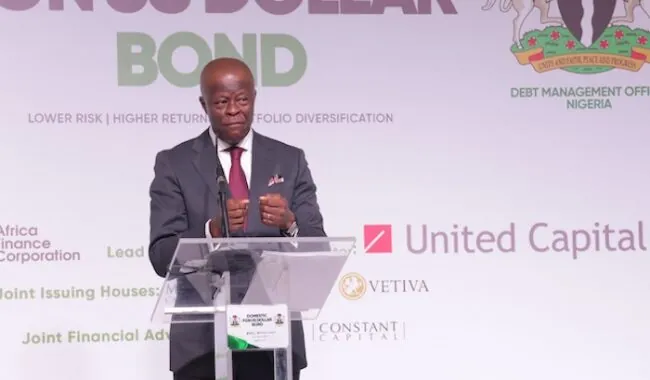The Federal Government of Nigeria has successfully issued a $500 million domestic dollar bond, offering a lucrative 9.75% interest rate to investors.
Key highlights1. Minimum InvestmentThe minimum investment is $10,000 with increments of $1,000 thereafter.2. Interest RateThe bond offers a 9.75 percent interest rate, paid semi-annually. For a $10,000 investment, investors can expect $487.5 in interest every six months for five years, with the principal returned at the end of the term.3. Issuance PurposeThe Federal Government’s domestic dollar bond, a $2 billion programme to be raised in four batches of $500 million each.The bond aims to support infrastructure development, financial inclusion, and deepen the domestic securities market. The proceeds will be invested in critical sectors of the economy, subject to presidential approval and National Assembly appropriation.4. Eligible InvestorsNigerians, non-Nigerians resident in Nigeria, Nigerians in the diaspora, and Qualified Institutional Investors.5. Issuance DurationThe offer was open from August 19 to August 30.6. Bond TenorThe bond has a five-year tenor.7. Tax BenefitsInterest on the bond is exempt from Company Income Tax, Personal Income Tax, and Capital Gains Tax.8. Investment AdvantagesLocal investors enjoy higher returns compared to domiciliary account interest rates. For Nigerians in the diaspora, it offers higher returns than in their countries of residence.9. RiskGovernment securities are considered risk-free due to government backing.10. ListingThe bond is listed on the Nigerian Exchange Limited (NGX) and FMDQ OTC Securities Exchange Limited.11. Financial Advisers and Issuing HousesMeristem Capital Limited, Stanbic IBTC, and Vetiva are the issuing houses, with United Capital as the lead. The African Finance Corporation is the global coordinator, with Constant Capital and Iron Capital as financial advisers.12. Differentiation from Local FGN Bonds and Eurobonds:The domestic dollar bond is issued locally in dollars and has a minimum investable amount of $10,000, while Eurobonds are issued abroad in foreign currencies and have a $200,000 minimum subscription amount .The domestic bond not only lowers the barrier of entry for several thousands of Nigerians, it also offers better returns to investors in Nigerian Eurobonds.At 9.75 percent, the coupon of the five-year domestic dollar bond exceeds the 9.58 percent yield on the Federal Government’s $1.25 billion 2029 Eurobond which matures in five years’ time.The FGN bonds are local bonds denominated in naira, so its interest and capital is paid in naira.13. Payment Method:Payment is made of both capital and interest is made in dollars through the Nigerian banking system and electronic transfers.14. Bank Verification Number (BVN)Investors, including those in the diaspora, are required to provide their BVN.15. Payment Method:Payment is made of both capital and interest is made in dollars through the Nigerian banking system and electronic transfers. This first-of-its-kind bond in the Nigerian capital market aims to support infrastructure development, financial inclusion, and deepen the domestic securities market.
The bond has a five-year tenor and offers semi-annual interest payments, with a minimum investment requirement of $10,000. Eligible investors include Nigerians, non-Nigerians resident in Nigeria, Nigerians in the diaspora, and Qualified Institutional Investors.
Key highlights
1. Minimum Investment
The minimum investment is $10,000 with increments of $1,000 thereafter.
2. Interest Rate
The bond offers a 9.75 percent interest rate, paid semi-annually. For a $10,000 investment, investors can expect $487.5 in interest every six months for five years, with the principal returned at the end of the term.
3. Issuance Purpose
The Federal Government’s domestic dollar bond, a $2 billion programme to be raised in four batches of $500 million each.
The bond aims to support infrastructure development, financial inclusion, and deepen the domestic securities market. The proceeds will be invested in critical sectors of the economy, subject to presidential approval and National Assembly appropriation.
4. Eligible Investors
Nigerians, non-Nigerians resident in Nigeria, Nigerians in the diaspora, and Qualified Institutional Investors.
5. Issuance Duration
The offer was open from August 19 to August 30.
6. Bond Tenor
The bond has a five-year tenor.
7. Tax Benefits
Interest on the bond is exempt from Company Income Tax, Personal Income Tax, and Capital Gains Tax.
8. Investment Advantages
Local investors enjoy higher returns compared to domiciliary account interest rates. For Nigerians in the diaspora, it offers higher returns than in their countries of residence.
9. Risk
Government securities are considered risk-free due to government backing.
10. Listing
The bond is listed on the Nigerian Exchange Limited (NGX) and FMDQ OTC Securities Exchange Limited.
11. Financial Advisers and Issuing Houses
Meristem Capital Limited, Stanbic IBTC, and Vetiva are the issuing houses, with United Capital as the lead. The African Finance Corporation is the global coordinator, with Constant Capital and Iron Capital as financial advisers.
12. Differentiation from Local FGN Bonds and Eurobonds:
The domestic dollar bond is issued locally in dollars and has a minimum investable amount of $10,000, while Eurobonds are issued abroad in foreign currencies and have a $200,000 minimum subscription amount .
The domestic bond not only lowers the barrier of entry for several thousands of Nigerians, it also offers better returns to investors in Nigerian Eurobonds.
At 9.75 percent, the coupon of the five-year domestic dollar bond exceeds the 9.58 percent yield on the Federal Government’s $1.25 billion 2029 Eurobond which matures in five years’ time.
The FGN bonds are local bonds denominated in naira, so its interest and capital is paid in naira.
13. Payment Method:
Payment is made of both capital and interest is made in dollars through the Nigerian banking system and electronic transfers.
14. Bank Verification Number (BVN)
Investors, including those in the diaspora, are required to provide their BVN.
15. Payment Method:
Payment is made of both capital and interest is made in dollars through the Nigerian banking system and electronic transfers.
ALSO READ THESE TOP STORIES FROM NIGERIAN TRIBUNE

